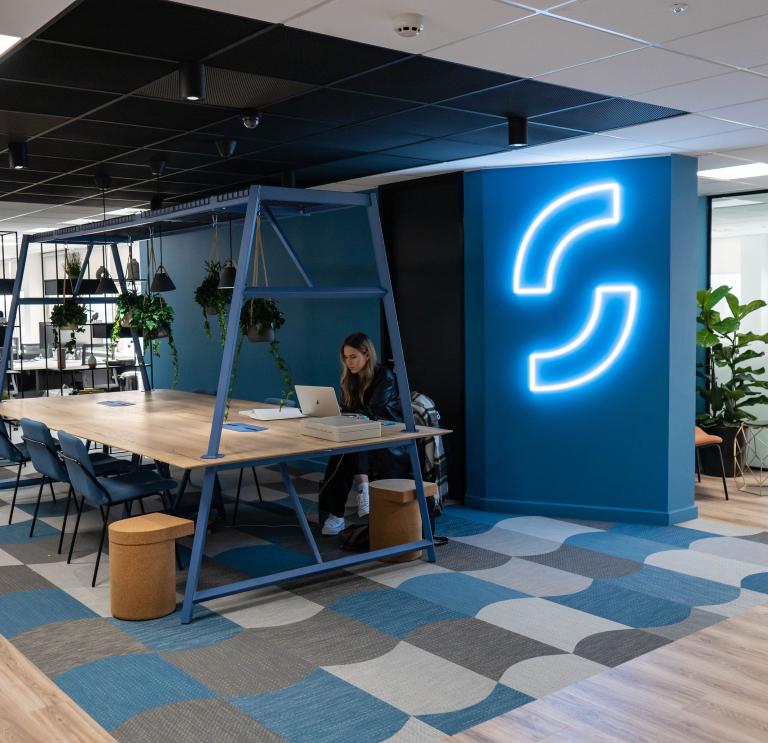Business backstory
In the 10,000-year history of banking, the fundamental principles have stayed pretty much the same. You could always bank on the banking system, so to speak. But then along came Anne Boden, founder and CEO of Starling Bank.
Banking On It is the title of Boden’s recent book, which tells the extraordinary story of how she hatched a new kind of bank. Or as the book’s subtitle says, “How I disrupted an industry and changed the way we manage our money for ever.”
Anne Boden was born in Swansea in 1960, the daughter of a steelworker and shop worker. She graduated in computer science at Swansea University and spent the next 30 years in the banking industry, rising to senior positions in the likes of AON, ABN AMRO, RBS and Allied Irish.
“Every other industry had been transformed by technology,” she explained. “Amazon changed the way we shop, and Spotify changed the way we bought music. But nobody had really changed the way we bank. So in 2014 I quit my job to start a bank.”
Easy as that. Except it wasn’t, of course. Her co-founder left to found rival neobank Monzo, taking all the original team with him. Boden continued to fly solo. Starling is now the fastest-growing bank in the UK. It was voted Best British Bank every year from 2018 to 2021.
Starling began as a disruptor, offering digital banking to retail customers who were fed up with the same-old way of doing things. The bank always planned to move into the massive business lending market, but not quite yet. Then along came the Covid-19 crisis.
The thing about nimble, tech-driven start-ups like Starling is that they can adapt quickly. They use cloud technology to power themselves, so they don’t need to carry the lumbering weight of infrastructure. They can build small, adaptable systems.
Starling had already built a new business-lending system. When the UK government launched its coronavirus business support schemes, Starling jumped at the opportunity to put their system to work. The business poured in. Starling lent more than £2bn via the government’s loans schemes. Almost overnight, it became a big player in the SME market.
“This crisis has put Starling in the forefront of many things,” said Boden. “We have been working very hard to get lots of new products to people in this very difficult time. We have stood up and done our bit to keep business running, and we are very proud to have done that.”
There’s more. They also bought mortgage books worth over £1bn. They plan to expand into Europe. At time of writing, the company is valued at around £1.1bn. There are talks of a floatation, perhaps in 2023. And they’re not looking at other neobanks as their competitors. They’re aiming to be bigger than Barclays in the business banking market within five years.
Why Wales?
At the same time, Starling has come home to its Welsh roots. In 2020 the bank joined Wales’s booming £8.5bn tech sector by creating 400 new jobs in Cardiff in its data science, fraud and customer services teams.
Boden said: “The Welsh tech sector is one of the fastest growing digital economies outside of London. Cardiff is also a bright, dynamic and entrepreneurial city with a supportive ecosystem which we are looking to tap into as we continue to grow our business and personal accounts.”
They’ve recruited lots of bright young local talent. Harriet Rees, the bank’s Deputy CIO, was already on board, but was delighted to tap into her homeland: “I was born and bred in South Wales so I was always acutely aware of the vibrant analytics community that existed here,” said Rees.
“There are lots of networks and a Fintech community in Cardiff for individuals that are coming out of university. We have been able to tap into a wealth of talent in the local area and beyond - not just university students, but also established talent that has been working in industry.”
As Starling continues to grow, it needs a reliable source of employees to service its new customers. “Wales has been really central to that,” said Rees. “We’ve opened offices in Cardiff and Southampton so that we can get out of the M25 and show people that Fintech doesn’t need to be London-centric. We’ve designed a beautiful space for our employees to work in and all of this has been done at such an affordable rate.”
How has the Welsh Government helped?
And since Fintech is one of our key industries here in Wales, we have been delighted to welcome Starling into our Fintech family.
“Our relationship with the Welsh Government has been extremely positive, said Rees. “They have been very supportive of all of our efforts to date. By working together we can really make Wales a place where careers can thrive. It’s no longer the case that to work in tech you need to live in East London. You can work in tech and live a stone’s throw away from the Brecon beacons or the coast.”
Welcome home, Starling.
Learn more about Starling on the Starling website.




